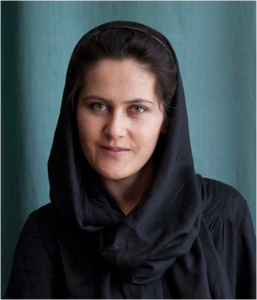Film DirectorÂ
My life is a very simple story. I am Afghan, but I was born in Mashed, Iran. (Near the border with Afghanistan) When I was 13 my father died and we moved to Tehran. At 18, I went to a university in the Czech Republic and studied film directing. Last year, I came back to Afghanistan and married. I work here, teach here, and sometimes I travel around the country. My main major in high school was mathematics and physics. But when I went to the University, I don’t know, somehow I went into art and I studied film directing.
I married a man that I never knew before. Sometimes I think I’m very stupid. I take a lot risks in life. But in this marriage I started to notice society more and more. My husband, he’s not like what I wanted. He is totally different. He doesn’t like art. He doesn’t speak about art, everything is political for him, but for me, being married to him is another kind of searching. It’s another experience. But I’m sure that I’m not going to divorce him, because every day there is something new about him that gives me something new about myself.
Through him, I start to really notice society. If I am to speak about them and if I want to criticize this culture then I need to know about it from experience. I live with my mother-in-law and my father-in-law. They’re totally religious and traditional people. They always pray. I don’t pray, and I come like this. (In blue jeans) I am the first bride who has spoken with them very openly. I don’t limit anybody in my house, I am myself. I just create a question in their minds.
What about film directing excites you?
For me film, and in general, cinema, is a way of thinking, and the way you can tell your thoughts, your opinions and your ideas about society, yourself, women, people, about what you agree with and what you don’t agree with. But the most important thing for me is the way of thinking about world in general. It’s not just technical issues it’s how I see my culture, how I criticize my culture, how I see. For me, to make films and especially to be a director of films is my life commitment.
So what do you want portray in your films?
I want to find my identity as a woman, not as a refugee girl. For that I moved to Czechoslovakia . Only in another culture could I find my identity that I had lost in Iran. It’s very important that people start to search inside themselves. Everyone’s way of searching is different. For photographers it is to take photos, for writers it is writing, for me as filmmaker, it is to make films. Filmmaking for me is a kind of questioning, a way of finding my identity that they took away from me.
…But when I began to really think for myself I started to make mistakes. These mistakes brought me back. Sometimes it was very painful, but I’m happy that I did these things because they helped me find myself.
This film, I made, Women Behind the Wheel, wasn’t a very perfect film but it was how I saw Afghan society at that time. When I started to live inside the Afghan society, and to communicate with different people I saw that the truth was much more painful than this picture showed.
It seems that even though your parents-in-law are very traditional, they don’t try to control you very much.
To them, I am a very educated woman and that is important for them. They always say, “You are a very educated woman, so you know what you do. But I also have very good support from my husband. So, when my husband agrees with something that they don’t like, they go along with it, but it’s very hard.
I must tell you we are a very lost generation. All of us, because of our age, we lived our lives for our mothers or fathers or family and then when we started to live our lives for ourselves it was a little late. We must respect everybody, our in-laws, our parents, etc, but we must also start to realize what we want, because our life is very short.
You can see lots of girls who are very modern and wearing stylish clothes and laughing in the street. But if you start to speak with them, you can see that they still don’t have their power. They don’t have the ability to say what they want because still they are afraid. For that, I want the intellectual people to start to speak their minds. I think they would have a lot of things to say.
Profile and pictures provided to us by and copyrighted to Peggy Kelsey, of Kelsey Photography taken from her book “Gathering Strength: Conversations with Afghan Womenâ€Â

0 Comments